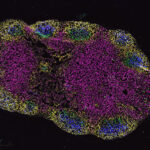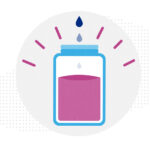Model enables study of age-specific responses to COVID mRNA vaccines in a dish

mRNA vaccines clearly saved lives during the COVID-19 pandemic, but several studies suggest that older people had a somewhat reduced immune response to the vaccines when compared with younger adults. Why? Researchers at Boston Children’s Hospital, led by Byron Brook, PhD, David Dowling, PhD, and Ofer Levy, MD, PhD, found some answers — while providing proof-of-concept of a new system that can model mRNA vaccine responses in a dish. This, in turn, could help expedite efforts to make vaccines even more effective.
The test system, called MEMPHIS (Modular Evaluation of immunogenicity using Multi-Platform Human In vitro Systems), analyzed whole human blood from people of different age groups. It applied both proteomics and targeted assays to measure the production of cytokines (immune signaling proteins) induced by mRNA vaccines.
“We are excited to report, for the first time, an ability to model age-specific responses to mRNA vaccines outside the body,” says Levy, who heads the Precision Vaccines Program at Boston Children’s. “Our model gives us insight into vaccine activity in vulnerable populations.”
Multi-pronged monitoring
As described in iScience, the team added the Pfizer/BioNTech COVID mRNA vaccine to blood samples from people in different age groups. Extensive tests, including systems biology approaches such as proteomics, then measured immune activation in response to the vaccine.
This approach identified muted innate immune responses in people over age 60 as compared with those age 18 to 50. In particular, older adults showed an impaired ability to support Th1 immunity, with diminished early inflammatory responses. They also had lower levels of four key cytokines (CXCL10, IL-1RA, IFN-gamma, and CCL4), biomarkers indicating a more robust immune response including T cell-mediated immunity.
“The early innate response to mRNA vaccines is critical in instructing the adaptive immune system, triggering maturation of CD4 T cells and supporting downstream cellular and antibody responses that are long-lived,” explains Brook.
The lower initial response observed with advancing age, also seen in mice, may explain why immunity induced by mRNA and other types of vaccines may wane more quickly in older adults, the researchers say.
While mouse studies have been a gold standard for research, they are expensive, time-consuming, and don’t always capture human immune biology accurately. The FDA Modernization Act 2.0, signed into law in 2022, now allows for alternatives to animal testing, including human cell and organoid models alongside systems biology approaches.
Levy emphasizes that their MEMPHIS test system, for which they’ve filed a patent, is an exemplar of this new approach. The system provides a nimbler way to predict age-specific human vaccine responses, allowing multiple vaccine doses and vaccine adjuvants — which boost the immune response — to be tested simultaneously in samples from the same person.
“If we could elicit a young-adult-like innate immune response in an elder, we might be able to provide better, more durable protection,” says Brook.
Vaccine development for infants and elders
Brook and Levy now plan a similar study in newborn infants who have distinct immune systems and vaccine responses. They also want to use their assay to find blood biomarkers that predict which mRNA vaccine is most likely to be effective in a given population.
“We want to accelerate vaccine development using human in vitro systems and use this approach to select which vaccine and adjuvant may be best suited to each age group,” says Levy. “While vaccines are safe and highly effective, we want to make sure people of all ages are optimally protected.”
Levy, Brook, Dowling, Simon van Haren, PhD, and other study co-authors are named inventors on patents related to human in vitro modeling of vaccine responses and vaccine approaches. Levy is also a co-founder of and advisor to Ovax, Inc. See the paper for further disclosures and acknowledgments. To inquire about this technology, contact Christopher Henley, JD, in Boston Children’s Technology & Innovation Development Office.
Learn more about the Precision Vaccines Program at Boston Children’s.
Related Posts :
-

Creating the next generation of mRNA vaccines
During the COVID-19 pandemic, mRNA vaccines came to the rescue, developed in record time and saving lives worldwide. Researchers in ...
-

From ‘hit to vial’: Discovery and optimization of a promising vaccine adjuvant
Many vaccines are only partially effective, have waning efficacy, or do not work well in the very young or the ...
-

Building better antibodies, curbing autoimmunity: New insights on B cells
When we’re vaccinated or exposed to an infection, our B cells spring into action, churning out antibodies that are ...
-

Boosting vaccines for the elderly with 'hyperactivators'
As we age our immune systems start to flag, leaving us more susceptible to cancer and infections — and less responsive ...





